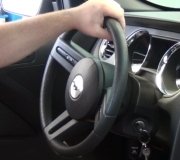The reason they're worried about leaking brake fluid is the rear wheel cylinders or calipers have rubber seals that could have gotten hot enough to melt or deform. You would find brake fluid leaking down the inside of the rear tires and onto the ground.
The brake fluid level will go down in the master cylinder's reservoir, but that is almost impossible to check because you have to know where the level was earlier. That level is normally going to go down as brake pads wear down. When it comes time to install new brake pads, the pistons have to be pushed back into the calipers. They worked their way out over the years as the old pads wore down. That is how all disc brakes self-adjust. When the pistons are pushed back into the calipers to make room for the new pads, that forces the brake fluid back up that had been filling in behind those pistons. This is why when you have regular services done, like oil changes, the mechanic will top off the other fluids, but never the brake fluid. Brake fluid is only low because you'll be needing new brake pads soon, or there's a leak that must be addressed.
What you can do now is to look at the brake fluid level, then check it every few days to see if it has gone down more. The additional clue to a leak is the brake pedal will sink slowly to the floor when you hold steady pressure on it. Don't actually push it more than half way down if you can help it. Due to internal crud and corrosion buildup, pushing the brake pedal further than it normally travels can damage the master cylinder and lead to the need to replace it.
One warning I have to include is when you check the brake fluid, (or when you add after doing other repairs to the system), you must never get any type of petroleum product contamination in it. That will cause rubber parts to swell, and everything with rubber parts will need to be replaced. That is a very expensive repair. This includes engine oil, transmission fluid, power steering fluid, and axle grease. Experienced mechanics even wash their hands with soap and water to prevent getting fingerprint grease in the brake fluid.
Thursday, June 11th, 2015 AT 8:18 PM


